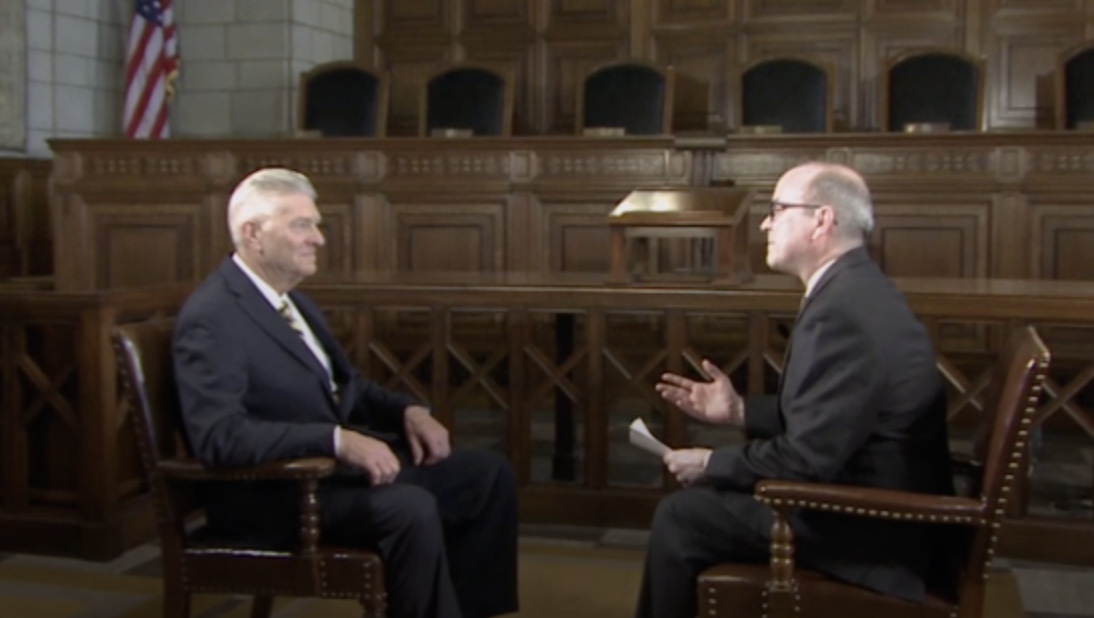Nebraska Courts Chief Supports Term Limits and Cameras in Courtrooms
Chief Justice Mike Heavican endorses two “fixes” in public television interview
 Fix the Court wants the federal courts to be more transparent. And it turns out that we have some of the strongest support in this arena coming from state judiciaries.
Fix the Court wants the federal courts to be more transparent. And it turns out that we have some of the strongest support in this arena coming from state judiciaries.
In a wide-ranging public television interview last month, Chief Justice of the Nebraska Supreme Court Mike Heavican endorsed ending life tenure in the U.S. Supreme Court and allowing greater courtroom broadcast access. (The text of the interview is below; it begins at 12:33 and 15:15 in this video.)
Heavican says he has long been a supporter of opening up the courts. “An open courtroom today is different than an open courtroom in 1890,” he said, adding, “to be really open in the 21st century you need that electronic access to the courts.”
When asked about the contentious Supreme Court nominations battles of recent years, Heavican suggested that life tenure was in part to blame. He pointed to tenure limits in Nebraska’s state courts as a better system for accountability and bipartisanship.
“I think it is an unfortunate part of the way that federal judges are appointed and the fact that they have lifetime tenure,” he said, “so there is absolutely no accountability in the federal system – or I shouldn’t say no – but there’s almost no accountably in the federal system.”
“Both sides of the political spectrum need to rethink their approaches to that appointment process,” he added.
Heavican, along with U.S. Supreme Court Justice Breyer and a majority of Democrats and Republicans, recognizes that term limits will lower the temperature of Supreme Court nominations and bring much-needed accountability to the federal courts.
Text of the interview:
HOST DENNIS KELLOGG: You’ve been a supporter of opening up Nebraska’s courts through the media, with cameras in the courtroom. […] why do you think it’s important?
CHIEF JUSTICE MIKE HEAVICAN: It’s important because in this day and age, I think people, especially young people, want to get their news, they want to get intellectual input, from computers and TV screens, so an open courtroom today is different than an open courtroom in 1890. In 1890 courts were the center of their communities, and when folks came to town to trade or buy groceries or whatever, they might end their day by visiting the courtroom just to see how the courts were functioning. And today, obviously, nobody does that. The courtrooms are all open but to be really open in the 21st century you need that electronic access to the courts, so we push that very much. When I became Chief Justice, I heard lots of comments from the bar and attorneys that we were the forgotten branch of government. We may still be the forgotten branch of government, but I like to think that we are less forgotten than we used to be. We will always be the forgotten branch of the government if we won’t at least let TV cameras into our courtrooms. […]
KELLOGG: Let’s look at it from a national perspective, with the U.S. Supreme Court. The last couple of nominees as they’ve gone through that process and the hearings, they seem to, at times, be a little bit chaotic and also political. Do you think those hearings have eroded the public trust in our court system?
HEAVICAN: That is a little bit difficult thing to comment. I think it is an unfortunate part of the way that federal judges are appointed and the fact that they have lifetime tenure, so there is absolutely no accountability in the federal system – or I shouldn’t say no – but there’s almost no accountably in the federal system. The emphasis is completely on judicial independence so the only point in that system where you can screen, if you will, judges is that point of appointment, the approval by the Senate. So that has become an unfortunate focal point, I think, that both sides of the political spectrum need to rethink their approaches to that appointment process. Fifty years ago, none of those kinds of contentious hearings would have happened, and unfortunately, they happen for every appointment to the Supreme Court now. Nebraska uses a different system, and most states do use different systems. In Nebraska, there’s a lot more accountability to the judicial system. We have a lot of judicial independence, but ultimately our judges have to stand for retention three years after they are initially appointed, and then for six-year terms after that. So every six years, every citizen in a particular district gets to vote whether or not that judge should be retained in office.